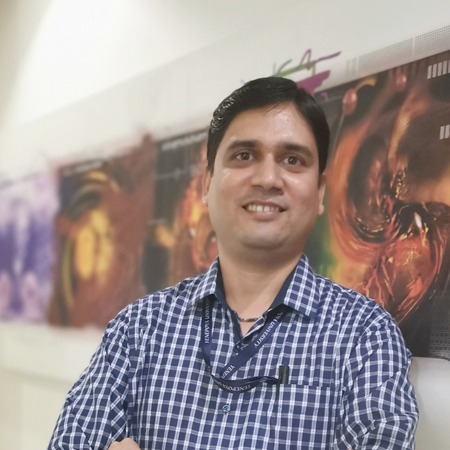
Dr. Prashant Kumar Modi
Associate Professor
-
PhD, Biochemistry
-
prashantmodi@yenepoya.edu.in, prashantmodi21@gmail.com
I did M.Sc. in Biochemistry from Devi Ahilya Vishwavidyalaya Indore in the year 2002. I started my research journey from Department of Zoology, Banaras Hindu University as a Junior Research Fellow. I got awarded Ph.D. degree from Banaras Hindu University, Varanasi in 2009. Further, I moved to the National Institute of Immunology, New Delhi in 2010 for postdoctoral research. My PDF work mostly focused on “Cell Cycle-Related Neuronal apoptosis in Alzheimer’s disease,” where I joined Dr. Pushkar Sharma’s research group. My PDF work mainly consisted of delineating the molecular mechanisms involved in cell cycle-related neuronal apoptosis in Alzheimer’s disease. Currently, my research interest in the identification of biomarkers and novel therapeutic targets in Parkinson’s disease and Alzheimer’s disease and identification of molecular targets of traditional Ayurvedic medicines having neuroprotective functions using cutting-edge technologies in genomics, proteomics and metabolomics.
PostDoc/Experience
- Assistant Professor ( May 2016-March 2023)- Center for Systems Biology and Molecular Medicine, Yenepoya Research Centre, Yenepoya ( Deemed to be University), Mangaluru, Karnataka, India
- Postdoctoral Fellow ( Research Associate) ( 2010- April 2016)-Eukaryotic Gene Expression Laboratory, National Institute of Immunology, New Delhi, India.
Awards/Honors
- Awarded SNCI-AIIMS 2013 award for the best oral presentation in 27th Annual Meeting of Society for Neurochemistry, India (SNCI) &International Conference on recent advances in molecular mechanisms in neurological disorders, AIIMS New Delhi
- DBT Research Associateship( 2011-2012), Dept. of Biotechnology, India, 2011-2012
- Senior Research Fellowship(2007-2009), Indian Council of Medical Research, India, 2007-2009
- Qualified CSIR-UGC NET(LS) December 2002
Research Interest/Area
Genomics, Proteomics and Metabolomics, Post-translational modifications in neurodegenerative disorders, Molecular targets of traditional Ayurvedic medicine.
Research
We are interested in dissection of signaling pathways in two different aspects of neurodegenerative disorders
Characterization of novel signaling pathways in neurodegenerative disorders
Neurons undergo various molecular and biochemical changes such as apoptosis during nervous system development and neurodegeneration. We are interested in delineating the signaling mechanism by studying various post-translational modifications such as phosphorylation, ubiquitinylation, acetylation, glycosylation, acylation, and sumoylation, involved in the pathophysiology of neurodegenerative disorders such as Alzheimer’s disease (AD) and Parkinson’s disease (PD). We employed cutting edge technologies such as Genomics, Proteomics, and Metabolomics to identify altered signaling molecules, which have diagnostic and prognostic values.
Dissecting the molecular mechanism involved in neuroprotective functions of Ayurvedic medicines
In Ayurveda, Several plants are used to improve memory and classified as Medhya Rasayanas. Our group also interested in the evaluation of neuroprotective properties of these plants (Medhya Rasayanas) in AD and PD. We are even interested in the identification of molecular mechanisms of action to bring neuroprotection by these plants in AD and PD. We employed functional proteomics and metabolomics platforms to identify molecular targets associated with the neuroprotective functions of these plants.
- Karthikkeyan, G., Behera, S. K., Upadhyay, S. S., Pervaje, R., Prasad, T. S. K. * and Modi, P. K. * (2022). Metabolomics analysis highlights Yashtimadhu (Glycyrrhiza glabra L.) mediated neuroprotection in a rotenone-induced cellular model of Parkinson’s disease by restoring the mTORC1-AMPK1 axis in autophagic regulation. Phytotherapy Research. 36(5):2207-2222.
- Najar, M. A., Aravind, A., Dagamajalu, S., Sidransky, D., Ashktorab, H., Smoot, D. T., Gowda, H., Prasad, T. S. K., Modi, P. K. and Chatterjee, A. (2021). Hyperactivation of MEK/ERK pathway by Ca 2+ /calmodulin-dependent protein kinase kinase 2 promotes cellular proliferation by activating cyclin-dependent kinases and minichromosome maintenance protein in gastric cancer cells. Molecular Carcinogenesis. 60(11):769-783.
- Rex, D. A. B., Kumar, S. T. A., Rai, B. A., Kotimoole, C. N., Modi, P. K. and Prasad, T. S. K. (2021). Novel Post-translational Modifications and Molecular Substrates in Glioma Identified by Bioinformatics. OMICS: A Journal of Integrative Biology. 25(7):463-473.
- Najar. M. A., Modi. P. K., Ramesh. P., Sidransky. D., Gowda. H., Prasad T.S.K., and Chatterjee. (2021). “Molecular profiling associated with Calcium/calmodulin-dependent protein kinase kinase 2 (CAMKK2) mediated carcinogenesis in gastric cancer”. Journal of Proteome Research. 20(5):2687-2703.
- Karthikkeyan, G., Pervaje, R., Pervaje, S. K., Prasad, T.S.K., and Modi, P.K. (2021). Prevention of MEK-ERK-1/2 hyper-activation underlines the neuroprotective effect of Glycyrrhiza glabra L. (Yashtimadhu) against rotenone-induced cellular and molecular aberrations. Journal of Ethnopharmacology. 274:114025.
- Karthikkeyan, G., Najar, M. A., Pervaje, R., Pervaje, S. K., Modi, P. K*. and Prasad, T. S. K. (2020). Identification of Molecular Network Associated with Neuro protective Effects of Yashtimadhu (Glycyrrhiza glabra L.) by Quantitative Proteomics of Rotenone-Induced Parkinson’s Disease Model. ACS Omega. 5(41):26611-26625.
- Chauhan, M., Modi, P. K. and Sharma, P. (2020). Aberrant activation of neuronal cell cycle caused by dysregulation of ubiquitin ligase Itch results in neurodegeneration.Cell Death Disease. 11(6):441.
- Yashodhar P. Bhandary, Sadiya Bi Shaikh, Mr. Mohd. Altaf Najar, Dr. Ashwini Prabhu, Dr. Prashant Kumar Modi and Dr. T. S. Keshava Prasad,“Molecular Biomarkers for Detection of Idiopathic Pulmonary Fibrosis”, Indian Patent, Full specification, 2021, 201941048222.
- S. L. Hoti, Keshava Prasad Thottethodi Subrahmanya, Ishwar Singh, Arun A. Bhagwath and Prashant Kumar Modi , “Parasitic Macrophage Migration Inhibitory Factor 2 of filarial parasite as a novel drug” Indian Patent, Full specification, 2022, 202141018695
